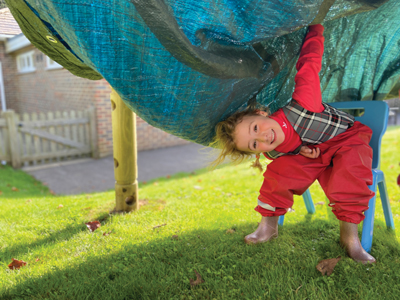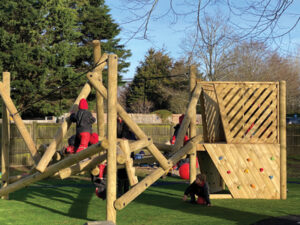
by Caroline Oglethorpe
Head of Nursery and Pre-Prep, Westbourne House School
Some of my happiest moments are spent outdoors, observing the beauty of nature and having adventures, and clearly children enjoy playing outside too. However, have you ever wondered how learning outdoors actually works in nurseries and schools? Early Years teachers (looking after children under five) observe significant and positive changes in children when time outdoors is used for high quality learning. So how do nurseries create these opportunities? What does outdoor learning look like? And can it really give children superpowers? Here are four reasons it can.
Taking risks!
It can feel counterintuitive to talk about wanting young children to take risks. However, it is now widely recognised that a risk-averse culture undermines children’s confidence and learning. Take the example of a nursery or school with a climbing stack for its Early Years pupils. This provides an exciting culture of risk and challenge for these young learners. For children who are not used to taking risks, the chance to climb gives them the opportunity to develop this key skill. Teachers witness the children challenging themselves, setting their own goals, succeeding and becoming more confident and motivated in doing so. This risk-taking attitude transfers to other areas of physical and intellectual learning. For example, new-found confidence outside leads to an open-minded approach to learning new phonic sounds in the classroom.
Climbing boosts handwriting
 The ability to write is an essential skill to learn and a tool for life. It is interesting to understand that developing children’s upper body strength is essential to help them control their hands and fingers. This is because there is a strength domino effect which starts at the top: once children can control the large muscle groups of the shoulder, upper back and core, they are able to exert more control on their upper and lower arm, which in turn enables them to control their hand well, before finally achieving fine motor control in the fingers. By climbing, pulling themselves up and hanging down, the muscles in the shoulder are well exercised and this has huge benefits for handwriting and, as they grow older, handwriting at speed.
The ability to write is an essential skill to learn and a tool for life. It is interesting to understand that developing children’s upper body strength is essential to help them control their hands and fingers. This is because there is a strength domino effect which starts at the top: once children can control the large muscle groups of the shoulder, upper back and core, they are able to exert more control on their upper and lower arm, which in turn enables them to control their hand well, before finally achieving fine motor control in the fingers. By climbing, pulling themselves up and hanging down, the muscles in the shoulder are well exercised and this has huge benefits for handwriting and, as they grow older, handwriting at speed.
Playdates with nature
It is easy to overlook the way our brain works and our cognitive abilities are all part of how the body functions and yet we all know how hard it is to concentrate when you are hungry, angry or both! The mind-body connection is incredibly important. Children benefit enormously from being in nature and we see calmer, happier children after they have spent time outdoors. Studies show that being in nature reduces cortisol, and therefore tension, heart rate and blood pressure, and increases a sense of wellbeing. Plus children can follow their curiosity freely and explore, enjoy and question nature along the way, boosting inquisitiveness and creativity on a daily basis.
The environment as the ‘third teacher’
Some schools and nurseries embrace the environment, inside and out, as the ‘third teacher’. What exactly do we mean by this? It is a way of seeing the possibilities of a well-thought-out environment, an environment that enables children to direct their own learning. It is about children exploring, using their natural desire to discover things for themselves, rather than having a fixed outcome from an activity.
A natural environment is obviously important and creates learning opportunities in itself. However, you can enhance the outdoor spaces further, changing them into dynamic arenas for enquiry-led learning, fostering skills such as creativity, collaboration, higher-order thinking and promoting a strong sense of self. For example:
• A climbing stack builds upper body strength and helps children to take risks.
• A den building area encourages children to develop their relationships and gain confidence in problem-solving.
• A water wall builds problem-solving and analysing skills, as well as enhancing mathematical and scientific concepts and vocabulary.
• A ‘mud kitchen’ area creates opportunities for sensory play, and the chance to apply skills which have been introduced in direct teaching time.
• A stage and music area allows children to hone their performance skills, and ensures that music and performance is accessible to everyone, all the time.
Superpowers?
So, what overall benefits do we see when outdoor learning is working well in a nursery or school? Children are more independent in their play and don’t ask what should they do. The style of play is elevated with all children better engaged. We see improved communication and negotiation. The children are more open-minded and curious in their approach to learning. The play flows seamlessly and is more creative. The children take more risks and are more resilient. They look out for one another. They problem solve and collaborate.
These are all essential life skills, learnt through outdoor and fun-filled exploration. The icing on the cake? The children’s confidence soars. Now that’s how outdoor learning gives you superpowers!
To discover more about the remarkable education at Westbourne House School Nursery & Pre-Prep, book a tour or come to our next open morning.
Please call 01243 782739 or visit www.westbournehouse.org/visit











